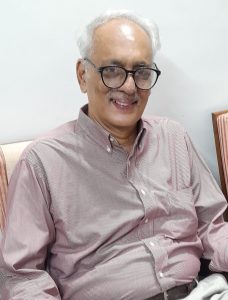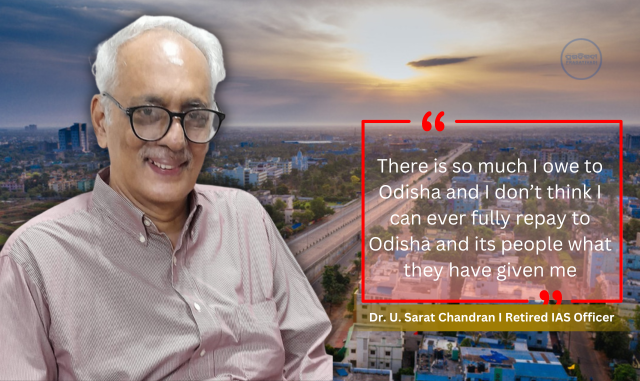
I was in the Odisha cadre of IAS, took early voluntary retirement in 2006 as I was selected for the position of Advisor at the IMF, Washington D C.
I visited Bhubaneswar again in February 2023 after a gap of around 16 years. Ever since I had my first posting as assistant collector ( part of the training period was in Puri), I had a close affinity and attraction to the temple of Lord Jagannath. It is a folk saying in Puri, unless lord Jagannath himself beckons you, you may not get an opportunity to visit the temple
Even though I was born and did my studies in Kerala, my professional life as an IAS officer has been in Odisha. It has indeed become my home away from home. Odisha was the state where I raised my family, the state which provided me the opportunity to work in several developmental spheres, the state from which I went to different posts in Government of India and abroad. Most importantly it was the state which provided my bread and butter. There is so much I owe to Odisha and I don’t think I can ever fully repay to Odisha and its people what they have given me.
City retains its serenity
It is with some trepidationthat one revisits a place one has known in earlier times, lest it would have lost its innate beauty and charm due to the rapid development that happens with the passage of time. I had the same apprehension when revisiting Bhubaneswar. However, my wife and I were immensely delighted to see that Bhubaneswar has marched ahead in infrastructure development without losing its uniqueness as a homely, welcoming city. One reason Bhubaneswar has not lost its beauty is that the infrastructure development has not come at the cost of environmental deterioration. The living presence of trees and vegetation gives an inexpressible peacefulness to the city.
A word of caution
I understand that Odisha is able to forge ahead in developmental activities due to its reasonably sound financial base. No state can maintain a sustainable development path without a strong resource base.However, a fact needs to be kept in mind is that if the revenue increases are on account of windfall gains such as a boom in the price of mineral resourcesthe situation can quickly turn adverse if there is a slump in prices an experience of many economies internationally. Hence the economics of the optimal use of mineral and natural resources addressing issues such as how much to exploit now and how much in future etc is critical to its resource base and for a sustainable development. An exponential increase in unproductive revenue expenditure on the illusion that revenue generation on account of a windfall gain would always continue is a recipe for financial instability for any economy. Odisha faced such a financial crisis in early 2000 to which I will come later.
A case study of a performing civil service
I would like to peg my discussion on an actual situation. I saw Odisha in financial doldrums but through effective policy making and implementation a competent and dedicated civil service, contemporaneously restored the financial health of the state and transformed it into a well-functioning economy.
The period was around 2003. Odisha found itself in enormous financial difficulties. It showed all the signs of a tottering economy. The revenue expenditure far exceeded the revenue receipts. This meant that the entire resources of the government were spent in paying the salary, pension and interest liability without any resources for development activities. In fact, borrowing which was meant for capital expenditure ( namely building roads,bridges,schools,hospitals etc ) was being diverted to paying pension and salaries etc. The tax/GDP ratio was low which was an indicator of the resource raising capability of a state. The debt/GDP ratio was too high. The state was in a debt trap. Such eventuality has serious economic consequences. If the debt/ GDP rises above a threshold level the growth potential of the state decreases. The state falls into a lower growth trajectory
Turn around
The silver lining in the dark financial storm facing the state was that, a statesman like politician was the Chief Minister ( Shri Naveen Patnaik) and an equallyfar-sighted individual was the Finance Minister ( Shri Profulla Gadai), and under that leadership a competent civil service could reverse the situation in a year or so. Several initiatives were taken which included among other things bringing a white paper on the financial situation of the state which got debated in the legislature and among the public. The state enacted the FRBM act ( Fiscal responsibility and budget management act) one of the first states to enact it . It laid down strict limits of how much fiscal deficit, debt, borrowing etc the state can have in a fiscal year. The finance minister and in turn the finance secretary were answerable if any deviation occurred, (this discipline was strictly followed).The state also put in place a structural adjustment loan so that funds for essential investments in infrastructure, health , education , social sectors etc did not suffer.
Within a year the state made a turnaround. Quite quickly, Odisha became one of the very few states having a revenue surplus in budget. As a result, it had adequate resources to carry out investments in the vital sectors of the economy.
Why some civil services seem to perform and others do not
The question now is why a group of officers who are selected by a common exam into IAS, IPS and other allied services, seem to perform well in some states and prove to be less effective in some others. More importantly can anything be done about it.
Blaming the politician
I have seen the civil service blame the politician for poor performance. I would not fully agree with that. At times burocracy takes cover for inferior performance under that argument. We are a democracy . A democracy can not function without political parties and politicians. A civil service has to live with that reality. However, there is something which the civil service can do. The senior beurocracy can convince the elected representatives that in the long run good governance is good politics. A fair, performing and competent civil service is an asset to any elected government. Here is where the acumen, wisdom and knowledge of the higher beurocracy comes into play.
How the deterioration starts
A superior performing civil service will have its focus on the people. Every decision taken in government affects the people in one way or another. To be continuously attuned to the needs and feedback is crucial for effective performance of a civil service. What often happens is that after the initial years in the service, may be the initial ten years when the officer is motivated by idealism; later as he or she rises in the hierarchy, the attention is turned away from the public and more on pleasing the whims and fancies of the politicians who would matter in their career.Here is where the deterioration starts. This is not to say that one should not listen to the elected representatives, but if their directions are contrary to rules, are palpably unjust and have adverse effects on the development goals and the public,the civil service should have the professional integrity to say no.One suggestion to improve matters in this regard is for the minister in charge and the secretary to bring before the people a set of performance targets for the fiscal year and both should be judged against such targets. If found wanting they should be asked to leave those positions.The public holding the feet of the politician and the civil servant to the fire is one way to enhance the performance of both in a democratic set up. In the civil service, especially at the higher level the standard of performance has to be set by the individual officers themselves. A cadre which encourages officers keep that bar high would be a superior civil service.
Reversing the decline
There are certain factors which are essential for making a strong and performing civil service. Knowledge competence is very important. An efficient civil service should have officers who are knowledgeable in the departments they head as each sector of the economy has become highly specialised. Every senior civil servant ( at the level of the secretary ) should have had at least two stints of central deputation with Government of India. This helps in expanding their technical competence, professional horizon and also helps to gain a more comprehensive outlook in dealing with complex and intricate issues.
There are certain time-tested processes and structures which have contributed the effectiveness of the civil service. Field visits and inspections by senior officers to the districts on a regular basis, the need to be fair and impartial (this applies very strongly to the police administration ), effective grievanceredressal both at the district and state levels by senior officers on a regular well monitored basis are time tested effective tools. In a strong performing cadre these processes are meticulously followed. But there are cadres which have ignored it making them less responsive to people’s problems and hence less productive.
A civil servant should not forget that the salary he or she gets is out of the tax payers’ money. That fact itself should make him or her feel their indebtedness to the people and strictly ensure that every decision and action is in the interest of the people . As a trustee of the people, they should also completely eliminate expenditures from the state exchequer for merely enhancing their personal comfort and not the welfareof the people.
Summing up
The quality of the civil service depends on the calibre of its officers . A civil service which has as its members; officers who are professional and knowledgeable, have exemplary integrity, who exhibit leadership qualities, who can instilcooperation and get things done, who are receptive to new and creative ideas and who, above all are empathetic and always keep the interest of the people uppermost, can be a superior service. A cadre having larger proportion of its officers having such qualities would be a superior performing one. It is the duty of senior members to mould the young officers into that genre.
Aldous Huxley in his old age was asked as to what he would do differently if he was to live his life again. After a bit of thoughtful pause, he said he would live his life with a little more kindness, affection, empathy and compassion for his fellow human beings. A competent civil service is one which has officers who have real empathy for the people whom they are supposed to serve.
Once again my profound gratitude to Odisha and its people who helped me grow professionally and personally and given me and my family so much. Odisha and its progress will be close to my heart.
About the Author:
Dr. U. Sarat Chandran, is a retired IAS officer, Ex Additional chief secretary Govt of Odisha, Ex Advisor IMF, Ex Secretary General Colombo Plan, Sri Lanka, Ex private secretary to Dr. Man Mohan Singh when he was deputy chairman Planning Commission, has held several senior positions in Economic Affairs department, GOI.
Disclaimer
The opinions expressed in the article are the personal opinions of the author. The facts and opinions appearing in the article do not reflect the views of Pragativadi and Pragativadi.com does not assume any responsibility or liability for the same.








